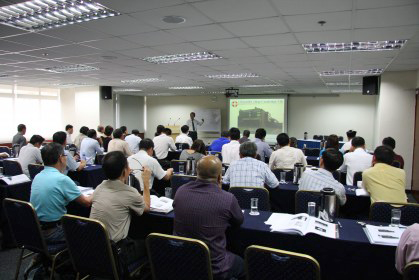|
 |
|
Home |
Consulting |
Training |
Expert Witness |
Failure Analysis |
Design Review |
Corrosion Test |
Corrosion Software |
Protective Coatings |
Materials Selection |
Cathodic Protection |
>>> |
|
Corrosion Control and Prevention in the Nuclear Power Industry |
|
Course Outline | Who Should Attend | Registration | In-House | On-Demand | Online Courses | PPT Slides+Testbank | Course List
|
Why WebCorr
|
|
Course Overview |
|
 Corrosion
issues have plagued the nuclear power industry for decades. There are a
number of complex corrosion mechanisms involved for steels and alloys
operating in the water/steam environments under high temperature and
high pressure. This 3-day training course covers common engineering
materials used in nuclear power plants, the various degradation
mechanisms and their mitigation methods for the structures, systems, and
components in boiling water reactors (BWRs ) and pressurized water
reactors (PWRs). Monitoring and inspection techniques are also
presented. Corrosion
issues have plagued the nuclear power industry for decades. There are a
number of complex corrosion mechanisms involved for steels and alloys
operating in the water/steam environments under high temperature and
high pressure. This 3-day training course covers common engineering
materials used in nuclear power plants, the various degradation
mechanisms and their mitigation methods for the structures, systems, and
components in boiling water reactors (BWRs ) and pressurized water
reactors (PWRs). Monitoring and inspection techniques are also
presented.
This corrosion short course is
available for on-site training, online and distance learning worldwide.
It can also be customized to meet the specific needs of your
organization.
|
|
|
|
Course Outline |
|
|
|
1. Introduction to Corrosion in the Nuclear Power
Industry
2. Overview of the Basic Designs of the BWR and PWR
3. Materials for Nuclear Applications
3.1 Metallurgy and
Irradiation Effects
3.1.1 Crystal
Structure and Grain Boundaries
3.1.2 Irradiation
effects on materials
3.2 Materials of Construction
3.2.1 Zirconium
3.2.2 Steels
3.2.3 Copper Alloys
3.2.4 Titanium
Alloys
3.2.5 Concrete
3.2.6 Polymers
4. Degradation Mechanisms
4.1 Radiation
Damage
4.2 Fatigue
4.2.1
Mechanical Fatigue
4.2.2 Thermal
Fatigue
4.2.3
Vibration Fatigue
4.2.4 Fatigue
in Geometrical Discontinuities
4.2.5
Environmental Fatigue
4.3 General Corrosion
4.4 Stress Corrosion Cracking
4.4.1
Transgranular Stress Corrosion Cracking
4.4.2 Primary
Water Stress Corrosion Cracking
4.4.3
Irradiation Assisted Stress Corrosion Cracking
4.5 Flow Accelerated Corrosion
4.6 Thermal Ageing
4.7 Galvanic Corrosion
4.8 Stress-Corrosion Cracking & IGA
4.9 Crevice Corrosion & Pitting
4.10 Fretting Wear & Flow-Induced Vibration
4.11 Hydrogen Effects
4.12 Microbiologically-Induced Corrosion (MIC)
5. Mitigation of Degradation in
Structures, Systems, and Components
5.1 Steel
Containments
5.2 Reactor Pressure Vessels in Pressurized Water
Reactors
5.2.1
Irradiation Embrittlement in the Region of the Reactor Pressure Vessel
Beltline
5.2.2 Under
Clad Cracking in Reactor Pressure Vessels
5.2.3 Primary
Water Stress Corrosion Cracking in Reactor Pressure Vessels
5.2.4 Bottom
Mounted Instrumentation Penetration Leaks in Reactor Pressure Vessels
5.2.5 Thermal
Ageing in Reactor Pressure Vessels
5.2.6 Fatigue in
Reactor Pressure Vessels
5.2.7 Corrosion in
Reactor Pressure Vessels
5.3 Pressurizers in Pressurized Water Reactors
5.3.1 Pressurizer
Relief Line Cracks
5.4 Monitoring and Mitigation Methods in Pressurized Water
Reactors
5.4.1 Mitigation of
Radiation Embrittlement
5.4.2 Mitigation of
Stress Corrosion Cracking in Penetration of Control Rod Drive Mechanisms
5.4.3 Vessel Head
Repair and Replacement
5.4.4 Inspection
and Monitoring
5.4.5 Surveillance
Programmes
5.5 Reactor Pressure Vessel Internals and Piping in Boiling
Water Reactors
5.5.1 Radiation
Embrittlement in Reactor Pressure Vessels and Overlay Cladding
5.5.2 Irradiation
Assisted Stress Corrosion Cracking and Intergranular Stress Corrosion
Cracking
5.5.3 Stress
Corrosion Cracking In Dissimilar Metal Welds
5.5.4 Environmental
Fatigue in Nozzles and Piping
5.5.5 Flow
Accelerated Corrosion in Carbon Steel Piping
5.5.6 Stress
Corrosion Cracking and Fatigue In Pumps and Valves
5.5.7 Thermal
Ageing Embrittlement in Duplex Stainless Steels
6. Integrity Assessment of Structures,
Systems, and Components
6.1 Inspection and Assessment Methods
6.1.1
Non-Destructive Testing
6.1.2 Destructive
Testing
6.1.3 Leak before
Break
6.2 Integrity Monitoring
6.3 Non-destructive Examination/In-service Inspection of
Reactor Pressure Vessels
6.4 Non-destructive Examination/In-service Inspection of
Steam Generators
6.5 Non-destructive Examination/In-service Inspection of
Reactor Pressure Vessel Heads
7 Corrosion of Containment Materials for Radioactive-Waste Isolation
8 Corrosion Modeling and Prediction Software for the Nuclear Power
Industry
9 End of Course Examination
|
|
Course Outline |Who Should Attend |Registration |In-House |On-Demand |Online Courses |PPT Slides+Testbank |Course List
|
|
Who Should Attend
This Corrosion Course |
|
Designers, Inspection Engineers, Maintenance
Engineers, Plant Inspectors, Mechanical Engineers, and Process Engineers in the
nuclear power industry.
|
|
Registration
for This Corrosion Course |
|
Click
here to register for this corrosion course online,
or
Click
here to download this corrosion course brochure with
registration form in PDF format.
|
|
In-House Training Corrosion Courses |
|
 If you are concerned with corrosion in your
company, in-house training or on-site training is a great solution to train a group of
employees from design, production, operation, quality assurance, inspection
and maintenance, and technical sales and support on corrosion control and
corrosion prevention technology. The contents of all our corrosion courses can
be customized to fit your organization's needs. If you are concerned with corrosion in your
company, in-house training or on-site training is a great solution to train a group of
employees from design, production, operation, quality assurance, inspection
and maintenance, and technical sales and support on corrosion control and
corrosion prevention technology. The contents of all our corrosion courses can
be customized to fit your organization's needs.
There is no limit to the number of participants required for
in-house training corrosion courses. We conduct the in-house training
corrosion course at your company's premises worldwide, and at a time convenient to
your company.
Click
here to contact us
for a quotation for in-house training corrosion courses. |
|
Corrosion
Course-On-Demand |
|
 All our publicly scheduled corrosion short courses are conducted once a year. However, you do not need to wait for one year if you have missed any of the publicly scheduled corrosion courses as we have this unique corrosion course-on-demand scheme: we will conduct the course just for you
(on an one-on-one basis) or for a small group from your company at a time and in a location convenient to you. This option costs significantly less than a full-scale in-house
or on-site corrosion training program. All our publicly scheduled corrosion short courses are conducted once a year. However, you do not need to wait for one year if you have missed any of the publicly scheduled corrosion courses as we have this unique corrosion course-on-demand scheme: we will conduct the course just for you
(on an one-on-one basis) or for a small group from your company at a time and in a location convenient to you. This option costs significantly less than a full-scale in-house
or on-site corrosion training program.
Click
here to contact us for a quotation. |
|
Online and Distance Learning Corrosion
Courses |
|
 All
our corrosion short courses are available for online or offline distance
learning. You can start an online corrosion course at any time and learn
at your own comfortable pace and schedule, whenever and wherever you
are. You have around-the-clock access to the interactive and media-rich
course materials, virtual labs, course instructions and course assessments. Discussions and questions related to the corrosion courses
are posted on the website or exchanged through email for a period up to 3 months. Video conferencing or instant messaging can also be arranged for discussions of course topics.
For those who do not have ready access to internet, we can send
you our online course materials on a CD-ROM, or DVD, or USB flash drive for offline
distance learning. All
our corrosion short courses are available for online or offline distance
learning. You can start an online corrosion course at any time and learn
at your own comfortable pace and schedule, whenever and wherever you
are. You have around-the-clock access to the interactive and media-rich
course materials, virtual labs, course instructions and course assessments. Discussions and questions related to the corrosion courses
are posted on the website or exchanged through email for a period up to 3 months. Video conferencing or instant messaging can also be arranged for discussions of course topics.
For those who do not have ready access to internet, we can send
you our online course materials on a CD-ROM, or DVD, or USB flash drive for offline
distance learning.
Click
here to to register an online corrosion short course. |
|
|
|
PowerPoint Slides and Test Banks for Trainers,
Instructors, Tutors, University Lecturers and Professors |
|
If you are involved in teaching or
training, you may wish to purchase a complete set of the trainer's
package for this training course. The trainer's
package comes complete with ready-to-use PowerPoint slides (fully
editable) and test bank (with answer keys). These ready-to-use
PowerPoint slides contain high quality color photographs, illustrations,
animations, audio and video clips. The test bank contains questions
conveniently grouped into four categories: (1) true or false, (2)
multiple choice, (3) calculation, and (4) reasoning and open-ended
discussions. The trainer's package is suitable for in-house training and
university teaching (30 lecture hours). This is exactly the same package that WebCorr uses to deliver our
current training course.
The one-time lump sum fee allows your
organization to use the training package and also modify it. For
example, your organization may modify the course contents and
re-name/re-brand the course under your organizationís name. WebCorr only
retains the copyright of the original PowerPoint slides and test banks.
Click
here to contact us if you need more information on the trainer's package. |
|
Course Outline |Who Should Attend |Registration |In-House |On-Demand |Online Courses |PPT Slides+Testbank |Course List
|
|
Home |
Contact Us |
Copyright
©
1995-2025. All rights reserved. |
 Corrosion
issues have plagued the nuclear power industry for decades. There are a
number of complex corrosion mechanisms involved for steels and alloys
operating in the water/steam environments under high temperature and
high pressure. This 3-day training course covers common engineering
materials used in nuclear power plants, the various degradation
mechanisms and their mitigation methods for the structures, systems, and
components in boiling water reactors (BWRs ) and pressurized water
reactors (PWRs). Monitoring and inspection techniques are also
presented.
Corrosion
issues have plagued the nuclear power industry for decades. There are a
number of complex corrosion mechanisms involved for steels and alloys
operating in the water/steam environments under high temperature and
high pressure. This 3-day training course covers common engineering
materials used in nuclear power plants, the various degradation
mechanisms and their mitigation methods for the structures, systems, and
components in boiling water reactors (BWRs ) and pressurized water
reactors (PWRs). Monitoring and inspection techniques are also
presented.  If you are concerned with corrosion in your
company, in-house training or on-site training is a great solution to train a group of
employees from design, production, operation, quality assurance, inspection
and maintenance, and technical sales and support on corrosion control and
corrosion prevention technology. The contents of all our corrosion courses can
be customized to fit your organization's needs.
If you are concerned with corrosion in your
company, in-house training or on-site training is a great solution to train a group of
employees from design, production, operation, quality assurance, inspection
and maintenance, and technical sales and support on corrosion control and
corrosion prevention technology. The contents of all our corrosion courses can
be customized to fit your organization's needs.
 All our publicly scheduled corrosion short courses are conducted once a year. However, you do not need to wait for one year if you have missed any of the publicly scheduled corrosion courses as we have this unique corrosion course-on-demand scheme: we will conduct the course just for you
(on an one-on-one basis) or for a small group from your company at a time and in a location convenient to you. This option costs significantly less than a full-scale in-house
or on-site corrosion training program.
All our publicly scheduled corrosion short courses are conducted once a year. However, you do not need to wait for one year if you have missed any of the publicly scheduled corrosion courses as we have this unique corrosion course-on-demand scheme: we will conduct the course just for you
(on an one-on-one basis) or for a small group from your company at a time and in a location convenient to you. This option costs significantly less than a full-scale in-house
or on-site corrosion training program. All
our corrosion short courses are available for online or offline distance
learning. You can start an online corrosion course at any time and learn
at your own comfortable pace and schedule, whenever and wherever you
are. You have around-the-clock access to the interactive and media-rich
course materials, virtual labs, course instructions and course assessments. Discussions and questions related to the corrosion courses
are posted on the website or exchanged through email for a period up to 3 months. Video conferencing or instant messaging can also be arranged for discussions of course topics.
For those who do not have ready access to internet, we can send
you our online course materials on a CD-ROM, or DVD, or USB flash drive for offline
distance learning.
All
our corrosion short courses are available for online or offline distance
learning. You can start an online corrosion course at any time and learn
at your own comfortable pace and schedule, whenever and wherever you
are. You have around-the-clock access to the interactive and media-rich
course materials, virtual labs, course instructions and course assessments. Discussions and questions related to the corrosion courses
are posted on the website or exchanged through email for a period up to 3 months. Video conferencing or instant messaging can also be arranged for discussions of course topics.
For those who do not have ready access to internet, we can send
you our online course materials on a CD-ROM, or DVD, or USB flash drive for offline
distance learning.